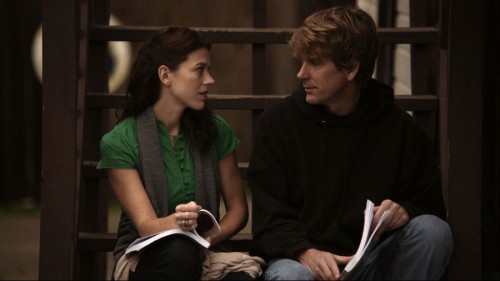Something Old, Something New, by Reed Lackey
28 Feb
One of my biggest criticisms of the genre known as the “Christian film” is that the films too often feel reactionary. Rather than being created from a desire to tell a good story and tell it well, many films in the “Christian” genre are responding to a specific cultural condition with a specific message and an undeniable agenda.
The latest film to fall into this category is Old Fashioned, written and directed by Rik Swartzwelder, who also stars as the lead role opposite Elizabeth Roberts. The film centers around a couple whose romance is more akin to “courtship” than dating and was specifically marketed as the Evangelical response to 50 Shades of Grey. I should be upfront about the fact that I wasn’t expecting much from it.
But the marketing campaign was probably a disservice to the film because what I saw offered me a few surprises, which not only endeared it to me as a positive entry in the “Christian film” genre, but also gave me some glimmers of hope for where that genre might be headed.
The story is that Clay, a small town businessman, rents a room to the adorable Amber, who only lands in town because it happened to be where her car ran out of gas. The two of them strike immediate chemistry, but Clay has some pretty rigid opinions– which he calls “theories”– about the inappropriateness of most of the modern dating model and refuses to even walk into her apartment with her because he doesn’t want to be alone with anyone who isn’t his wife. The first smart step this film takes is in a very early statement Amber makes to Clay after witnessing his extremely conservative behavior around her. “Old-fashioned,” she says, “that’s a little ‘on-the-nose’…”
But even though the film winks at its agenda so early, the first hour is a mess. The establishment of this world and the people who live in it barely feel believable for a metaphor, let alone for a film, and the behavior of its characters either too heavily foreshadows their back stories or completely betrays them.
The film’s beats play out in that same clichéd manner as well. The characters tell each other things about their life and their motivations not because the characters want to know, but because the audience needs to know. There is a section of the film’s audience that won’t mind this style, but for the critical or discerning viewer, the first hour will feel tedious.
The performances are competent, with the two leads standing at opposite ends of the quality spectrum (Elizabeth Roberts is a breath of fresh air, full of charm and believability, while Swartzwelder’s performance is sometimes painfully paint-by-numbers), the script is direct and lacks any shade of nuance and the film makes somewhat bizarre editing inserts which often interrupt the flow of the scenes rather than enhance it.
It may not sound like I cared very much for the film, and with the first hour, that’s mostly true. But the narrative takes a turn at the halfway mark which both shifted and elevated every element of the film I’ve criticized thus far. The story takes a single evening in the life of its characters, challenges them, and introduces complexity into what had previously been a singularly predictable narrative. I even found myself wondering if the film would have a happy ending or not, which for a Christian film is quite the achievement.
With the narrative’s development, the performances begin to elevate as well, as the actors are finally called upon to display emotional depth and range beyond the most basic building blocks of a clichéd story. The dialogue still felt a little too direct in places and one plot wrinkle felt a bit too convenient, but essentially I was suddenly watching a genuinely good movie.
But my favorite moments in the film involved conversations where the lead character’s extreme stances from the first hour begin to be confronted and tempered, not by villainous antagonists, but by characters who love him and whom we care for as an audience. It didn’t quite justify the stereotypes of the first half, but it came close. I expected a rigid and extreme propaganda piece on how the world does dating relationships wrong, but the last hour instead made a case that perhaps the other extreme on the conservative side is wrong too, and perhaps the best way might lay somewhere in the middle, where a higher standard is reached for without condemnation for those who don’t rise to it.
If the first half of Old Fashioned had been as brave as the second half, perhaps I’d be excitedly recommending this film to you. I can still do that for fans of simple romances (or the Hallmark Channel) because the film is undeniably romantic and fits well within that genre. Yet, as it stands, I can still cautiously recommend it for those interested in where Christian films might be heading, because there really is a good movie in Old Fashioned, mostly hiding behind the tropes we’ve come to expect, but peeking its head out in the film’s latter moments in a surprising way.




No comments yet